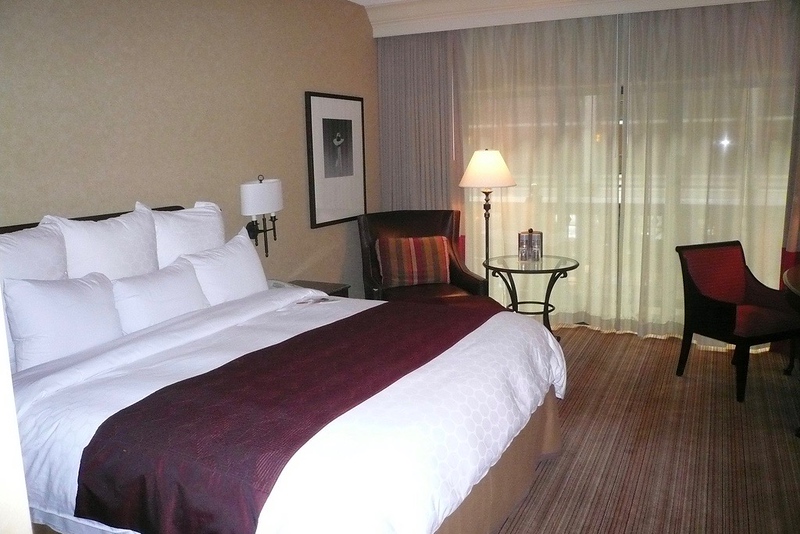The battle of our generation: Teenagers vs. Sleep
Credit: King bed enaissance Marriott Austin Texas, Flickr user mrkathika
Teenagers are struggling to get their recommended nine hours of sleep. The lack of sleep is affecting teenagers in several ways. “I see people who come in on a Monday morning and say that they didn’t get sleep last night because they were up doing a paper, when really they had all weekend to do it,” Scheoff said.
April 10, 2019
Just like how we eat food to function and maintain energy throughout the day, our brains need sleep. During sleep, important body functions and brain activity occur. So, why has a large part of our generation disregarded the importance of sleep? Lack of sleep has become a common trait in teenagers, and both adults and teenagers themselves must recognize how it affects them. Fixing this problem does not require dire solutions.
“I think nine plus hours is what is recommended for teenager’s sleep,” WHS nurse Amy Scheoff said. “It’s also about quality sleep. You want to go to sleep without a whole bunch of things on your mind if you can.”
Aside from the importance of getting nine-plus hours of sleep, it’s also vital to have good sleep hygiene.
“You want good sleep patterns, good sleep habits [and good] sleep hygiene,” Scheoff said. “It’s where you’re trying to get to bed at the same time every night and waking up at the same time every day, not getting all revved up before going to sleep and not having your phones at your bedside before going to sleep and during your sleep.”
Sleep hygiene is the recommended behavioral and environmental practice that is intended to promote better quality sleep. However, it is very difficult for teenagers to go to bed at the exact same time every night due to sports and practices, homework and the biggest threat of them all: procrastination.
“I see people who come in on a Monday morning and say that they didn’t get sleep last night because they were up doing a paper when really they had all weekend to do it,” Scheoff said. “So I think for a lot of people, [lack of sleep is] about time management.”
Many students are aware of their procrastination habits, yet they continue to do it. It is easy to get distracted by many other things, ultimately leading to last-minute homework sessions late at night.
“I go to sleep for around four to five hours during the week when I have school,” junior Mia Wong said. “I procrastinate a lot. I procrastinate by going on Youtube, going on Instagram or talking to my friends.”
Many teenagers feel so sleep deprived that when they come home they will take a nap. These naps tend to push back their schedules and cause more problems.
“Generally, I take a nap after school,” Wong said. “If I don’t take a nap after school, then I procrastinate and then do my work. Even if I do procrastinate, I will usually nap after that. [I nap for] one to two hours.”
When students don’t get the recommended nine hours of sleep, they tend to substitute their sleep in for unhealthy energy drinks or other caffeinated substances. Students feel the need to resort to these energy-fillers because, without them, they aren’t able to stay on task in class.
“I think that in order to make up for lack of sleep, students will turn to other substances like coffee, caffeine, 5-hour energy and other energy drinks, which I don’t think are particularly good for teenagers,” wellness teacher John Berry said. “I’m not saying they’re horrible, but when people are depending on caffeine to get through their day, they run into problems.”
If it’s not because of procrastination, students usually stay up because of addiction to their phones. Many times when students get into bed early, they will choose to stay up for several more hours attached to their phones.
“I know a lot of teenagers who actively put their phones outside of their rooms and go to bed at nine o’clock,” Berry said. “I know a lot of teenagers that sleep with their phones next to their head on their pillow. I think a lot of it is up to the individual and up to families to have these discussions, as well as maybe having teachers emphasize these lessons.”
The majority of students at WHS feel that lack of sleep makes it more challenging to be attentive in class. Other students feel that not getting enough sleep makes them feel sick or causes them to have headaches. Lack of sleep often results in loss of concentration or problems with their focus.
“I feel really tired and sometimes it gets hard to concentrate,” Wong said. “Other times it results in me falling asleep in class or getting really drowsy.”
For teenagers, lack of sleep has become a normality. Falling asleep at night is hard when there is so much to do and so much on our minds.
“I think when you’re a teenager it’s normal to sleep later,” sophomore Nick Urato said. “But sometimes it’s hard to get to bed early. On average I get like eight hours of sleep, but sometimes I do get five to six hours of sleep.”
Not getting enough sleep has become normal, which is problematic because the lack of sleep can cause many issues both physically and emotionally.
“Lack of sleep makes everybody a little bit more vulnerable to not feeling their best,” Scheoff said. “Lack of sleep can also lead to lack of clarity in thinking, so you’re not going to do your best academically. Driving certainly could be impaired, as well as social relationships and relationships at home could be affected.”





![Last Wednesday, the Wayland School Committee gathered to discuss a number of topics regarding the health curriculum and Innovation Career Pathway course. Another large topic of conversation was the ways to potentially mitigate distracting cell phone usage. "These [phones] are going to distract your learning and social relationships," Superintendent David Fleishman said. "That's concrete right there."](https://waylandstudentpress.com/wp-content/uploads/2025/06/Screenshot-2025-06-04-at-9.49.31 PM-1200x886.png)



























![Troy Hoyt finishes the Boston Marathon, running for the Hoyt Foundation. T. Hoyt is the son of Hoyt Foundation CEO Russ Hoyt.
“[Running a marathon] might seem like a big thing, when it’s presented to you at first, but if you break it up and just keep telling yourself, “Yes, you can,” you can start chipping away at it. And before you know it, you’ll be running the whole 26 miles, and you won’t even think twice about it.” T. Hoyt said.](https://waylandstudentpress.com/wp-content/uploads/2025/04/C36E8761-1CBB-452E-9DF2-543EF7B1095E_1_105_c.jpeg)















































Gavelbind • Apr 10, 2019 at 10:53 PM
Sleep! Sleep is for the weak! (and those with proper planning skills)